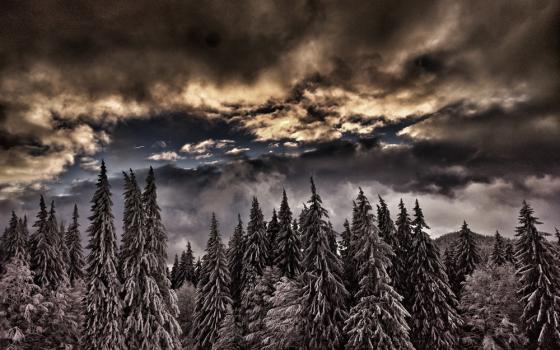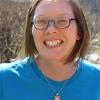I am gripping ski poles through fleece-lined mittens, my feet secured to cross-country skis. My arms and legs slide back and forth, propelling me forward along the trail.
I have only been in these woods on this bright Saturday morning for about 10 minutes, but my warm breath is already fogging up my thick glasses. The snow is slightly crusty and slick, so each motion makes a crunching sound in the otherwise quiet woods.
This is only my second time venturing out onto this trail this winter, but this time I feel more awkward than before. I first fell as I tried to secure the skis to the boots, and I have been slipping all over the trail since. Yes, I enjoy skiing, but by no means am I skilled or experienced. Although I have cross-country skied since childhood, before this winter — my first in the Wisconsin northwoods — it has been a decade since I skied. I have never been athletic or competent at much that requires good coordination.
The last time I was on this trail, I was with my sister and her friend who came to visit from Iowa. We began our trek into the woods in late afternoon and a little too close to dusk. As we got deeper into the woods, the daylight dimmed. By the time we had looped around to the trailhead, only a ray of flashlight glowing from a cellphone illuminated our way forward. That time, I only fell a couple times. Mostly, I felt courageous and happy for the adventure.
Now, I am alone. I haven't spotted any people, only footprints. This time, I can see the path ahead. And each sighting of a downward slope brings a quicker heart rate, shallower breath, tightened muscles. I already have lost count of how many times I have fallen.
At one point, I move down a slope smoothly, but then I feel unsure of how to stop. With that thought, I plop right over and tumble down the hill. Later, a steeper slope brings me quickly to the bottom, unable to slow. So I fall right down, feeling my twisted arm ache beneath me as I groan out loud, "Thank you, God, for my strong bones!"
______
Lately, I have heard many people speak of the current condition of our society as being a time of "great darkness." Referring to the executive order banning people from predominately Muslim nations from entering the United States, Cardinal Blase Cupich of Chicago issued a statement saying that we are in a "dark moment in U.S. history."
Others have used the words "dark" and "divisive" to describe President Donald Trump's inauguration speech, spurring this recent defense of nationalism found in National Review. In my little corner, a recent staff meeting at the spirituality center where I minister had us pondering: How can we help people to not be afraid of the dark?
I heard my colleague describe an effort to help an aching person experience God's presence in the dark, to increase a sense of trust that God is there, too.
Certainly, many holy people have taught us of the power of darkness. St. John of the Cross' poem "The Dark Night of the Soul" has influenced Christian spirituality for centuries. And St. Mother Teresa experienced a long, spiritual darkness, saying such things as, "I am told God lives in me — and yet the reality of darkness and coldness and emptiness is so great that nothing touches my soul."
***
I understand darkness. I have experienced its weight, too: the ugly, heavy, burdensome thickness. The sensation that one might stumble or become lost. Such darkness is not unlike the paralyzing depression that has made me weepy and irrational in the past. Or, more recently — and frequently — the anxious insomnia that causes me to sit up in the quiet of night, concerned about things beyond my control.
Yet I am not convinced that darkness is completely negative. In Advent, during the darkest part of the year in this part of the world, I often want to savor darkness, to slow it down, to let it be my teacher. I find the dark beautiful.
I am reminded of the Scripture:
If I say, "Surely darkness shall hide me,
and night shall be my light" —
Darkness is not dark for you,
and night shines as the day.
Darkness and light are but one.
(Psalm 139:11-12)
***
I continue to make my way through the quiet woods upon these awkward skis, hearing the crunch of the snow beneath me and a distant whir of snowmobiles in the background. Although I am moving through the woods in the bright day, I continue to fall. A lot. I come around a corner too quickly and ram my body right into some bushes, my knees and wrists crashing onto the solid skis. Then, I tumble down a hill and land on my side. I even lose my footing on a flat spot and drop to the ground.
To say I am getting beat up alone in these woods would not be an exaggeration. Afterward, I find I am limping, bruised and sore. It even has become tough to see because giant tears froze onto my lenses at some point. I can't help but laugh at myself as I make way back home.
Last time I was on this trail, along with my visiting sister and her friend, I was much better at skiing. Despite the darkness, I only fell down a little. Perhaps, I wonder, I was more courageous then because I was with others; I wasn't alone. I was better coordinated then, even in the darkness, because other people gave me strength.
Since we are children of God, we don't need to fear the dark. No matter how intense or painful the societal, psychological and spiritual darkness, we can gain courage if we remain connected with others. As Pope Francis stated during the 2013 interview that was published in America, "The ministers of the Gospel must be people who can warm the hearts of the people, who walk through the dark night with them, who know how to dialogue and to descend themselves into their people's night, into the darkness, but without getting lost."
Together in the dark, by God's grace, we can make our way through without getting lost, without falling down so much and getting hurt. Community creates the courage we need to find our way home.
[Julia Walsh, is a Franciscan Sister of Perpetual Adoration, a retreat presenter and a blogger who can be found online at MessyJesusBusiness.com.]

